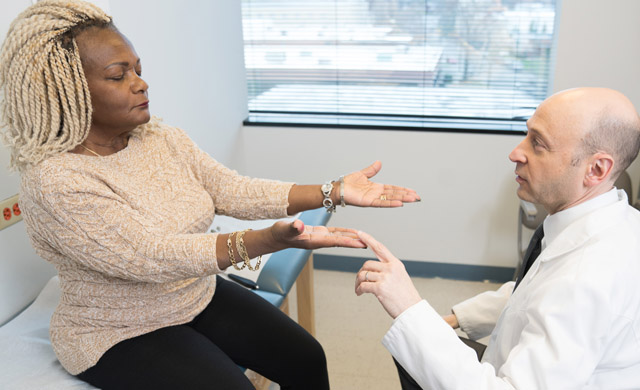Alzheimer’s Disease
Alzheimer’s disease causes problems with memory, thinking, and behavior. It’s the most common type of dementia. As a neurodegenerative disorder, it’s a chronic disease that starts slowly and worsens over time.
While there is no cure for Alzheimer’s, we can use drug and nondrug treatments to help both cognitive and behavioral symptoms.
Amyotrophic Lateral Sclerosis (ALS)
ALS is a rare neurodegenerative disorder. It typically causes nerve cells to break down slowly over time, which leads to extreme muscle weakness.
There is no single test that lets us diagnose ALS. If you have physical symptoms of ALS, we can use blood tests, muscle biopsy, and an MRI to rule out other possible causes. We may also perform an EMG and nerve conduction studies to assess your muscle and nerve health.
Medication and physical therapy can slow the progression of ALS and ease discomfort, but there is currently no cure.
Carpal Tunnel Syndrome
Also called median nerve compression, carpal tunnel syndrome causes numbness, tingling, and sometimes pain in your hands and arms. It occurs when the median nerve is compressed or irritated where it travels through your wrist.
We use EMGs and nerve conduction tests to diagnose carpal tunnel syndrome. A typical treatment plan for carpal tunnel includes occupational or physical therapy and a brace for your wrist. Severe cases may benefit from surgery.
Concussion
If you experience a strong blow to your head or violent shaking of your head or body, you may get a concussion. Concussions are traumatic brain injuries that can cause headaches, confusion, memory loss, nausea, vomiting, fatigue, sleepiness, or ringing in your ears.
The symptoms are generally temporary, but it’s important to see a doctor if you suspect a concussion. We can assess the damage to your brain using noninvasive tests, like an MRI, a CT scan, or a cognitive assessment.
Epilepsy
This neurological disorder produces unpredictable seizures caused by unusual electrical activity in your brain. However, the reason for this activity can vary from person to person.
We use blood analysis and neurological tests, including EEGs, MRI, and CT scans, to diagnose epilepsy. Treatment may include medications, surgery, vagus nerve stimulation (VNS), or responsive neurostimulation (RNS).
Parkinson’s Disease
Parkinson’s disease is a neurodegenerative disorder that causes tremors, balance and gait problems, slow movements, and rigid limbs. In addition to these movement-related symptoms, some people experience depression, constipation, sleep issues, anosmia (loss of the sense of smell), and cognitive impairment. Symptoms differ among individuals.
There is no single test that we can use to make a firm diagnosis of Parkinson’s. We’ll assess symptoms and medical history closely, and we may use PET scans, CT scans, or MRI to further evaluate how your body is functioning.
We can provide medication and guidance on lifestyle changes to control your symptoms.
Other Conditions
Other conditions and symptoms that we assess and treat include:
- Aneurysm
- Aphasia
- Arteriovenous Malformations
- Ataxia
- Bell’s palsy
- Cerebral palsy
- Coma
- Creutzfeldt-Jakob disease
- Encephalopathy/Encephalitis
- Guillain-Barré syndrome
- Huntington’s disease
- Hydrocephalus
- Malignant hyperthermia
- Meningitis
- Meralgia paresthetica
- Muscular dystrophy
- Myasthenia gravis
- Myoclonus
- Myopathy
- Neuralgia
- Neuropathy
- Pseudotumor cerebri
- Spinal cord injury
- Stroke
- Syncope
- Tinnitus
- Tremor
- Trigeminal Neuralgia
- Vertigo
